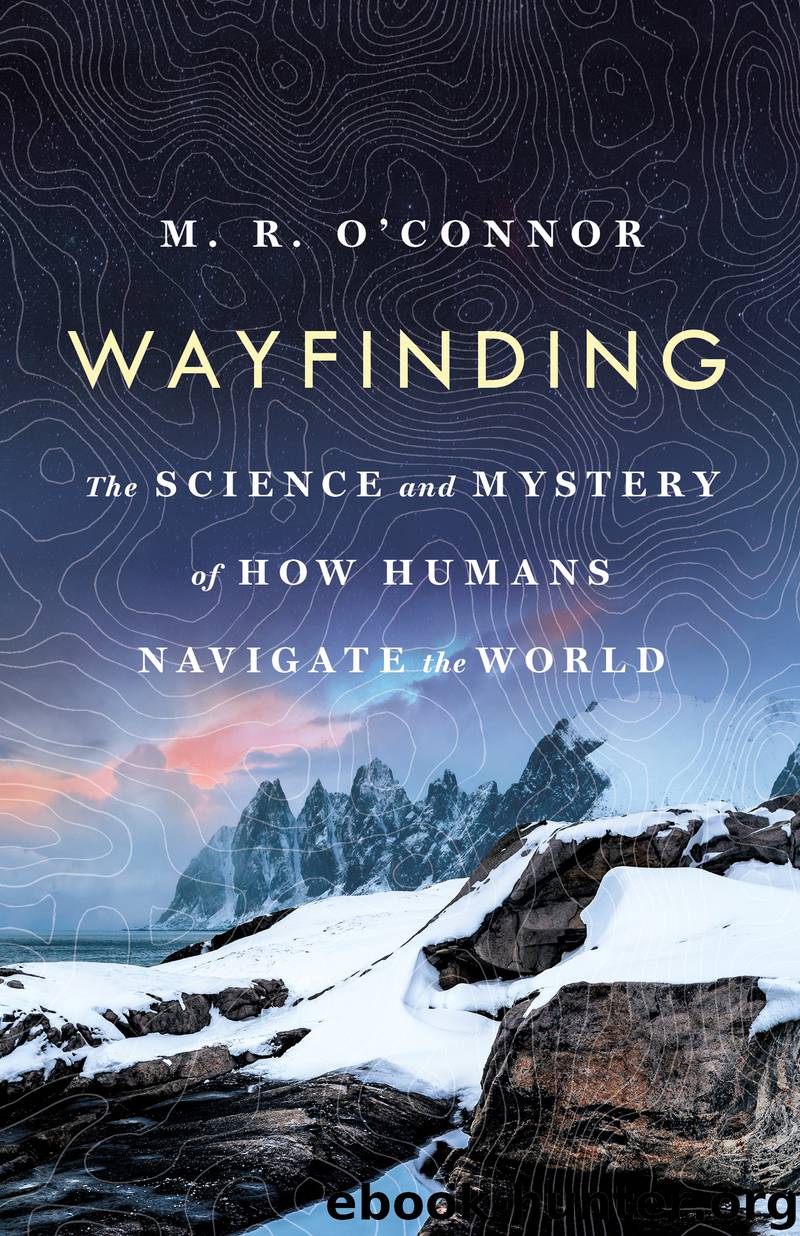Wayfinding by M. R. O'Connor

Author:M. R. O'Connor
Language: eng
Format: epub
Publisher: St. Martin's Press
YOU SAY LEFT, I SAY NORTH
Does the language we speak and the words we use to describe space influence our perception of reality? The psychologist James Gibson describes knowing as an extension of perceiving. Children become aware by looking around, listening, feeling, smelling, and tasting, and others step in along the way to make them aware through instruments and tools, toys, pictures, and words. Yet all of these things—especially words—are different depending on what culture you are born into. Do people raised in different cultures see the same world?
Around the same time Gibson was studying psychology at Princeton, the American linguist Benjamin Lee Whorf was at Yale University trying to understand how the human mind might organize experience and phenomena differently depending on the linguistic system people used. Whorf studied Native American languages under his mentor Edward Sapir, and their body of work resulted in the Sapir-Whorf hypothesis—the idea that language determines and limits thought and knowledge. This theory was influenced by the work of Franz Boas, the German-American anthropologist who had lived on Baffin Island in the 1880s and who had noted the diversity of words the Inuit possessed to describe snow. (Sapir later became Boas’s student.) While Sapir proposed that language influences how people think, Whorf went further, asserting that language reflects entirely different concepts about the world, including fundamental notions of time.
Sapir passed away in 1939 and Whorf died just two years later. Over the subsequent decades the majority of linguists, largely led by Noam Chomsky, adopted a different theory of language, that of universal grammar. The universalists believed that different languages each describe basic, innate concepts and that we are born with an a priori knowledge about things like space and time that are informed by our shared biology, the boundaries of our physical bodies, and our cognitive structure.
It was decades before the Sapir-Whorf hypothesis was revived, in part due to the work of an American linguistic anthropologist by the name of John Haviland, who lived with an Aboriginal community of about eight hundred people on the Cape York Peninsula in northeastern Australia. Haviland had gone there in the early 1970s to do postdoctoral research, and the first thing he did was begin to learn their language, called Guugu Yimithirr, from an old man called Billy “Muunduu” Jack. Eventually Jack gave Haviland a room in his home and adopted him as a son. As he learned the language, Haviland realized that while many European languages rely on phrases like “in front of” and “behind,” these didn’t exist in the Guugu Yimithirr speakers’ grammar. Such phrases depend on an egocentric frame of reference—they use the position of the speaker or subject as the point of orientation. Sentences like “She is to the left of the tree” or “The tree is to the left of the rock” utilize a relative conception of space that depends on the perspective of the speaker to the tree or the rock. Guugu Yimithirr speakers did not have words for “right,” “left,” or “back.
Download
This site does not store any files on its server. We only index and link to content provided by other sites. Please contact the content providers to delete copyright contents if any and email us, we'll remove relevant links or contents immediately.
The Lonely City by Olivia Laing(4802)
Animal Frequency by Melissa Alvarez(4474)
All Creatures Great and Small by James Herriot(4322)
Walking by Henry David Thoreau(3962)
Exit West by Mohsin Hamid(3828)
Origin Story: A Big History of Everything by David Christian(3692)
COSMOS by Carl Sagan(3625)
How to Read Water: Clues and Patterns from Puddles to the Sea (Natural Navigation) by Tristan Gooley(3469)
Hedgerow by John Wright(3363)
How to Read Nature by Tristan Gooley(3341)
The Inner Life of Animals by Peter Wohlleben(3319)
How to Do Nothing by Jenny Odell(3302)
Project Animal Farm: An Accidental Journey into the Secret World of Farming and the Truth About Our Food by Sonia Faruqi(3221)
Origin Story by David Christian(3202)
Water by Ian Miller(3188)
A Forest Journey by John Perlin(3077)
The Plant Messiah by Carlos Magdalena(2935)
A Wilder Time by William E. Glassley(2863)
Forests: A Very Short Introduction by Jaboury Ghazoul(2842)
